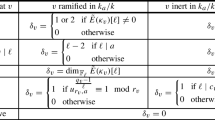Abstract
In this paper, we show that every quadratic algebraic number lying in a quartic extension L of \({\mathbb {Q}}\) can be written as a quadratic polynomial with rational coefficients in a generator of L over \({\mathbb {Q}}\). On the other hand, we prove that for each totally real algebraic number \(\beta \) of degree \(d \ge 3\), there are infinitely many quadratic extensions L of \({\mathbb {Q}}(\beta )\) such that \(\beta \) cannot be expressed by a quadratic polynomial with rational coefficients in a generator of L over \({\mathbb {Q}}\). The same assertion is proved for a large class of cubic algebraic numbers \(\beta \) without assumption that \(\beta \) is totally real.
Similar content being viewed by others
References
Awtray C and Jakes P, Galois groups of even sextic polynomials, Canad. Math. Bull. 63 (2020) 670–676
Drungilas P and Dubickas A, Reducibility of polynomials after a polynomial substitution, Publ. Math. Debrecen 96 (2020) 185–194
Huard J H, Spearman B K and Williams K S, Integral bases for quartic fields with quadratic subfields, J. Number Theory 51 (1995) 87–102
Hudson R H and Williams K S, On Legendre’s equation \(ax^2+by^2+cz^2=0\), J. Number Theory 16 (1983) 100–105
Kappe L C and Warren B, An elementary test for the Galois group of a quartic polynomial, Amer. Math. Monthly 96 (1989) 133–137
Lang S, Algebra, 3rd ed., Graduate Texts in Mathematics, Vol. 211 (2002) (New York: Springer)
Lemmermeyer F, Binomial squares in pure cubic number fields, J. Théor. Nombres Bordeaux 24 (2012) 691–704
Lemmermeyer F, Composite values of irreducible polynomials, Elem. Math. 74 (2019) 36–37
Mordell L J, Diophantine equations, Pure and Applied Mathematics, Vol. 30 (1969) (London, New York: Academic Press)
Müller P, A note on a conjecture by Ulas on polynomial substitutions, J. Number Theory 205 (2019) 122–123.
Nagell T, Introduction to number theory (1951) (New York: John Wiley & Sons) (Stockholm: Almqvist & Wiksell)
Park C M and Park S W, Minimal degrees of algebraic numbers with respect to primitive elements, Int. J. Number Theory 18 (2022) 485–500
Schinzel A, Polynomials with special regard to reducibility, (2000) (Cambridge: Cambridge University Press)
Ulas M, Is every irreducible polynomial reducible after a polynomial substitution? J. Number Theory 202 (2019) 37–59
Author information
Authors and Affiliations
Corresponding author
Additional information
Communicated by U K Anandavardhanan.
Rights and permissions
About this article
Cite this article
Dubickas, A. Minimal degree of an element of a number field with respect to its quadratic extension. Proc Math Sci 133, 11 (2023). https://doi.org/10.1007/s12044-023-00732-8
Received:
Accepted:
Published:
DOI: https://doi.org/10.1007/s12044-023-00732-8



